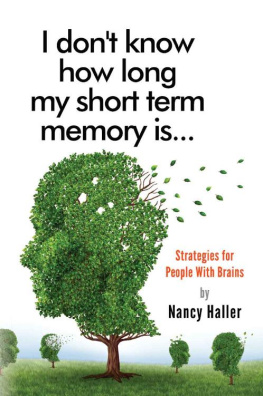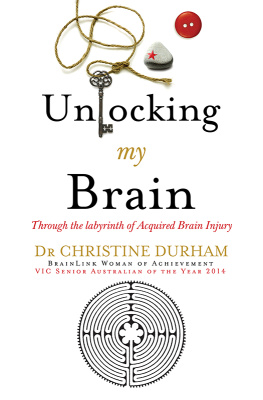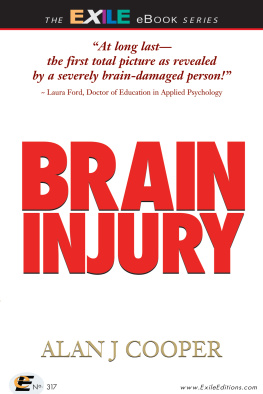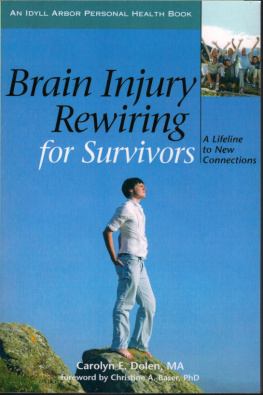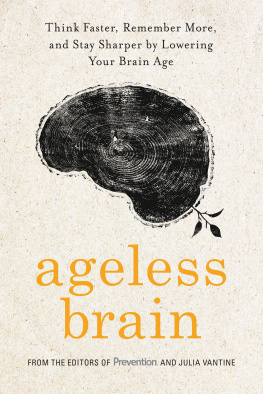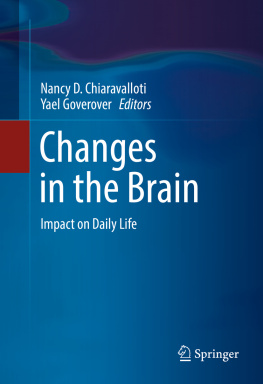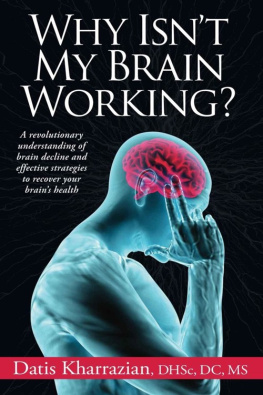.
.
Library of Congress Number 2012946702
ISBN-13: 978-0-9881792-0-2 Paperback
ISBN: 978-0-9881792-2-6 Hardback
ISBN-13: 978-0-9881782-1-9 E-book
eBook ISBN: 978-0-9881792-1-9
Copyright 2010 by Nancy Haller
All rights reserved. No part of this publication may be reproduced, stored in a retrieval system, or transmitted, in any form or by any means, electronic, mechanical, photocopying, recording, or otherwise, without the prior written permission of the publisher
I dont know how long my short term memory is Strategies for People With Brains is written by Nancy Haller and is not intended as medical advice. Its intent is solely informational and educational. Please consult a health professional should the need for one be indicated.
The terms Feldenkrais Method, Feldenkrais, Awareness Through Movement, Functional Integration and The Feldenkrais Guild are Registered Marks of the Feldenkrais Guild of North America.
.
Table of Contents
.
.
Are you living with some form of brain injury:
concussion, stroke, TIA, dementia, Alzheimers, TBI (traumatic brain injury), or a level of brain damage?
Are you experiencing brain fog; raging hormonal imbalance, aging brain, drugs, alcohol, environmental toxicity or chronic pain?
Are you totally brain tired; feeling like you are exhausted, totally overloaded, overwhelmed, over stressed and over it?
Do you know someone who is experiencing any of these issues to some degree?
This book is for YOU!
Feel free to read this book a page or a chapter at a time.
Read it as you are comfortable. Put it down when you need a break. Pick it up when you are ready to receive more information.
.
Two parts make up this conversation.
The first part describes common situations that occur in daily life. The examples offer the opportunity to assess yourself and your personal relationship with family, friends or people in your community. Everyone as they progress through their life will be touched by these subjects. Populations from children to seniors are difficulties as they face the new brain challenges presented every day. The fear of being experiencing labeled a failure, inept, an invalid or disabled make this conversation delicate.
The second part consists of 31 individual 30-60 second moments of awareness. Each of the simple short exercises is designed to increase attention to small details in movement. These small movement sequences focus the brain to awareness of different areas of the body. As awareness grows the image of our personal self grows clear. Neuroplasticity is the ability for the brain to make new pathways, only made possible when attention to the details of the change is observed and then can eventually be replicated. With brain issues, the communication to and from the brain takes longer. Information has to be in an understandable form to be processed and filed for future use. The process continues through life from birth to death.
Begin with one exercise, incorporate it into your daily life. Add another exercise as you are comfortable. There is no particular order, choose an exercise you find interesting.
.
Each day is a treasure.
Find the gems!
.
One of the last things I thought I would ever hear
You do know you have a brain injury.
The truth. I did not.
Synchronicity in life is an amazing thing.
It is with hind sight that I now assess how I walked each step in my life without information to understand how all the pieces would fit into the whole picture. It has been a synchronistic process of layered events that assisted in my educational process resulting in acquiring necessary assessment skills. Being able to observe my brain in terms of where I am strong and where there are weak areas is a skill few possess. Being able to articulate to others is a very unusual skill. There are experts extremely knowledgeable in how the brain functions but they lack personal experience. My education and skills offer rare opportunities to look at both sides of these issues. Working in teams of experts and brain issue survivors to develop materials and tools will improve the potential healing outcomes for many.
I began studying the somatic, mind and body connections when I joined Guild Certified Feldenkrais training in 1993. The Feldenkrais Method of Somatic Movement was developed by Moshe Feldenkrais, D.Sc. in the mid 1940s. His method educates the mind through awareness of slow small movements that clarify posture balance and movement. The slow pace and light pressure allows the nervous system and brain time to receive the request and respond. These responses are necessary to change a pattern of restriction or injury. Through this re-education process the body is able to replicate the newly learned patterns. Training in the method over four year, learning hundreds of movements and building self-awareness changed my outlook and set the stage for the future.
Six years later I suffered neurological damage while having jaw surgery. While I looked the same, my brain was different. In the middle of the forest, I could not see the trees. Unaware of the extent of my injury, I immediately forged ahead in my life. I was a single parent raising two children, both on target for college. Familial and work obligations became my driving force in moving forward.
Between the recovery from surgery and the anesthesia fog I assumed my new condition of living in the brain blue screen was relatively normal. I visually saw a shade of blue in my mind when I wanted to access something that was not available at the time. Sometimes it took me longer to remember something and other times I was unable to remember at all. I assumed the sorting and constructing of the lost files from my memory would occur over time. Some files are gone forever; both my long and short-term memories were disrupted. I noticed changes in my balance and vision that varied depending on my activity and exhaustion levels. Some of the changes were just fleeting moments or stumbles in the path. To someone else observing me, they might not have been noticeable, but to me, they were monumental. On the other hand some things I did not notice had changed but they were enormous to others.
Most noticeable to those around me was the change in my speech. When I spoke, it was with what sounded like a foreign accent. Everyone asked me, Where are you from? Seattle, I replied, much to the confusion of everyone around me. I did not hear the accent or the change in my speech patterns. I continued to hear what I knew as my voice prior to the surgery.
In 2002, I went to Deanna Britton, a speech therapist and was diagnosed with Pseudo Foreign Accent Syndrome (FAS). Upon further testing, it was assessed that only 52% of my individual word and 70% of conversational sentences in my speech were understandable by others. I was referred to a neurologist for further testing to look for a brain tumor or lesion.
I drove home from the appointment on automatic pilot. I was shocked and overwhelmed with the new information. It was not a possibility. It was not true. I was too busy. I did not have a brain problem.
Foreign Accent Syndrome (FAS) is a very rare speech disorder with fewer than 100 people in the world having this diagnosis. Foreign Accent Syndrome most commonly follows some form of brain injury or damage. The speaker sounds like they have an accent from another country. It is common to have speaking rhythm, word order and sentence structure altered.

